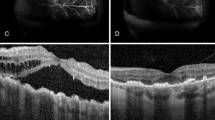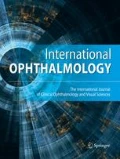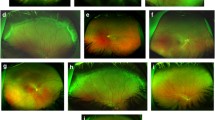Abstract
Purpose
To report a case series of three patients with intractable uveal effusion syndrome (UES), treated with partial thickness sclerectomy and intravitreal anti-VEGF therapy.
Methods
Three patients with intractable UES were included. All patients underwent intravitreal anti-VEGF therapy to facilitate resolution of uveal effusion. The concentrations of IL-1β, IL-6, IL-8, IL-10, IL-12p70, TNF and VEGF in aqueous humor were measured.
Results
After the last intravitreal injection, all three eyes had total resolution of the chorioretinal detachment or subretinal fluid. One eye experienced improvement in visual acuity. All patients were free from recurrence during the follow-up period. Aqueous IL-6, IL-8 and VEGF concentrations were elevated in all cases.
Conclusions
Our current data provided the evidence that VEGF was increased in eyes with intractable UES and anti-VEGF therapy was effective, suggesting that partial thickness sclerectomy and intravitreal anti-VEGF therapy could be a new choice for intractable UES.



Similar content being viewed by others

References
Elagouz M, Stanescu-Segall D, Jackson TL (2010) Uveal effusion syndrome. Surv Ophthalmol 55:134–145
Schepens CL, Brockhurst RJ (1963) Uveal effusion. 1. Clinical picture. Arch Ophthalmol 70:189–201
Gass JDM (1983) Uveal effusion syndrome: a new hypothesis concerning pathogenesis and technique of surgical treatment. Retina 3:159–163
Casswell AG, Gregor ZJ, Bird AC (1987) The surgical management of uveal effusion syndrome. Eye (Lond) 1:115–119
Bird AC (2010) Therapeutic targets in age-related macular disease. J Clin Invest 120:3033–3041
Aiello LP, Avery RL, Arrigg PG et al (1994) Vascular endothelial growth factor in ocular fluid of patients with diabetic retinopathy and other retinal disorders. N Engl J Med 331:1480–1487
Nakao S, Arima M, Ishikawa K et al (2012) Intravitreal anti-VEGF therapy blocks inflammatory cell infiltration and re-entry into the circulation in retinal angiogenesis. Invest Ophthalmol Vis Sci 53:4323–4328
Uyama M, Takahashi K, Kozaki J et al (2000) Uveal effusion syndrome: clinical features, surgical treatment, histologic examination of the sclera, and pathophysiology. Ophthalmology 107(3):441
Wang B, Tian B, Tao Y et al (2014) Continued decline of aqueous interleukin-8 after multiple intravitreal injections of ganciclovir for cytomegalovirus retinitis. J Ocul Pharmacol Ther 30:587–592
Matlach J, Nowak J, Göbel W (2013) A novel technique for choroidal fluid drainage in uveal effusion syndrome. Ophthalmic Surg Lasers Imaging Retina 44:274–277
Mirabelli P, Peebo BB, Xeroudaki M et al (2014) Early effects of dexamethasone and anti-VEGF therapy in an inflammatory corneal neovascularization model. Exp Eye Res 125:118–127
Author information
Authors and Affiliations
Corresponding author
Ethics declarations
Conflict of interest
All authors declare that they have no conflict of interest.
Ethical approval
All procedures performed in studies involving human participants were in accordance with the ethical standards of the institutional and national research committee and with the 1964 Declaration of Helsinki and its later amendments or comparable ethical standards.
Informed consent
Informed consent was obtained from all individual participants included in the study.
Rights and permissions
About this article
Cite this article
Guo, J., Cao, X. & Li, X. Partial thickness sclerectomy and intravitreal anti-VEGF therapy for intractable uveal effusion syndrome. Int Ophthalmol 39, 1885–1890 (2019). https://doi.org/10.1007/s10792-018-0992-1
Received:
Accepted:
Published:
Issue Date:
DOI: https://doi.org/10.1007/s10792-018-0992-1



